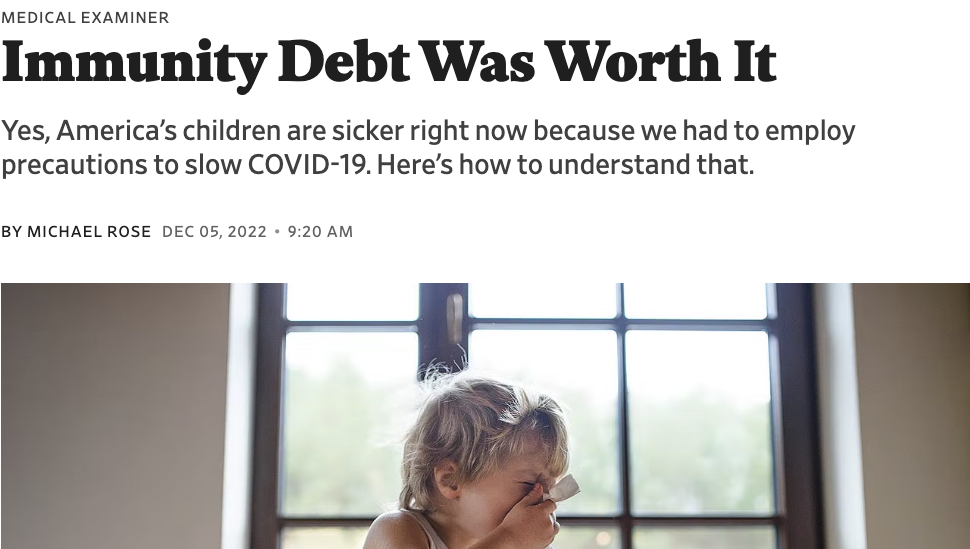Yesterday morning, Slate published an article by a paediatric doctor about ‘immunity debt’. In the piece, the writer explains how hospitals like his are struggling to deal with an influx of children suffering from respiratory viruses:
The language is emphatic, even apocalyptic, with the author warning that ‘the usual winter wave of viruses has become a tsunami’. No wonder, then, that Slate went for a suitably solemn headline:

But look just below the title and readers are presented with a slightly different picture. Despite the sick children filling up waiting rooms and makeshift emergency tents outside, we are reassured in the article’s standfirst that ‘COVID restrictions were worth it’. The piece itself, however, doesn’t appear to be quite so confident in that assessment. Indeed, if anything, the writer argues the opposite:
Further down the piece, there is a tacit acknowledgement that this debt ‘may be worthwhile’ if healthcare systems are becoming overwhelmed. But in order to prevent another outbreak of other respiratory viruses, ranging from pneumonia to bronchiolitis, the author also recommends that, going forward, we should employ nonpharmaceutical interventions ‘more strategically’:
All these points seem to build up to a conclusion about the damaging consequences of lockdown. And yet, the author abruptly changes course, ending with a vague conclusion: ‘Our collective efforts to stem the tide of the pandemic saved countless lives; it was ultimately good debt’.
Stranger still is the number of headline iterations the piece went through after publication. In the space of 48 hours, the title evolved from the original (above) to ‘Immunity debt: what is it, and why it was worth it’ before finally landing on ‘immunity debt was worth it’.


There is nothing wrong with changing a headline after publication so long as it is for accuracy rather than political ends. It is never easy capturing all the nuance of a piece in a single title, but the way in which each one was watered down to fit a more pro-lockdown narrative is striking. By repeating the rote line about the ‘collective effort’ of lockdown and ‘stemming the tide’, it is as if Slate is trying to ward off any hint of scepticism about this apparently good and just cause.
As more reports come out each week about the negative downstream effects of lockdown, it will become increasingly difficult for liberal publications like Slate, who beat the lockdown drum so loudly during the pandemic, to straddle between the two positions. Rather than couching every Covid-related piece in service of lockdown, it would be better off — and much easier — dealing with each story on a case-by-case merit.











Join the discussion
Join like minded readers that support our journalism by becoming a paid subscriber
To join the discussion in the comments, become a paid subscriber.
Join like minded readers that support our journalism, read unlimited articles and enjoy other subscriber-only benefits.
Subscribe